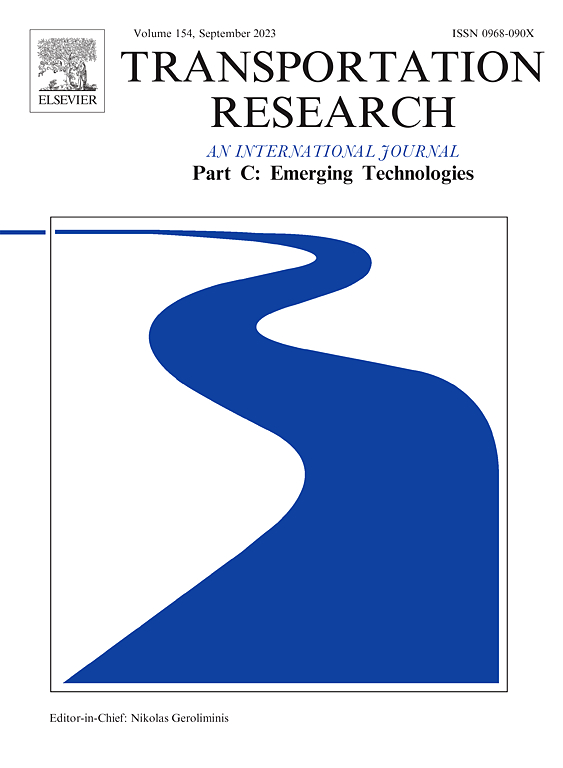Berth allocation in dry bulk export terminals with channel restrictions
IF 7.6
1区 工程技术
Q1 TRANSPORTATION SCIENCE & TECHNOLOGY
Transportation Research Part C-Emerging Technologies
Pub Date : 2025-07-16
DOI:10.1016/j.trc.2025.105263
引用次数: 0
Abstract
Efficient berth allocation (BA) is critical to port management, as berthing time and location directly impact operational efficiency. In dry bulk export terminals, the BA problem becomes more complex due to deballasting delays and pre-deballasting procedures, particularly under restrictive channel conditions. Terminal operators must balance pre-deballasting requirements with timely berthing to minimize delays. To address these challenges, we formulate the BA problem as a dynamic program, enabling sequential decision-making for each ship at every stage. To address the extensive state-action space, we propose a hierarchical decision framework that divides each stage into four planning-level substages and one scheduling-level substage, each handled by a dedicated agent. The planning level determines berthing positions and ship sequence, while the scheduling level coordinates berthing, channel access, and deballasting timelines based on planning outcomes. We propose a Planning by Reinforcement Learning and Scheduling by Optimization (PRLSO) approach, where agents employ either reinforcement learning (RL) or optimization, depending on substage characteristics. By confining RL-based agents to a reduced decision space, we significantly reduce training complexity. Following this, the remaining scheduling problem is solved on a reduced scale free from computational challenge. Experimental results show that the proposed method generates high-quality solutions in near real-time, even for large-scale instances. The framework also improves training efficiency and supports industrial-scale implementation.
有通道限制的干散货出口码头泊位分配
有效的泊位分配是港口管理的关键,泊位的分配时间和位置直接影响港口的运行效率。在干散货出口码头,由于卸压延迟和预卸压程序,特别是在限制性通道条件下,BA问题变得更加复杂。码头运营商必须平衡预压载要求和及时靠泊,以尽量减少延误。为了应对这些挑战,我们将BA问题制定为一个动态程序,以便在每个阶段对每艘船进行顺序决策。为了解决广泛的状态-行动空间,我们提出了一个分层决策框架,将每个阶段分为四个计划级子阶段和一个调度级子阶段,每个阶段由一个专用代理处理。计划层决定靠泊位置和船舶顺序,而调度层根据计划结果协调靠泊、通道访问和压载时间表。我们提出了一种通过强化学习规划和优化调度(PRLSO)方法,其中智能体根据子阶段特征采用强化学习(RL)或优化。通过将基于强化学习的智能体限制在减少的决策空间中,我们显著降低了训练的复杂性。在此之后,剩余的调度问题在没有计算挑战的情况下以较小的规模解决。实验结果表明,即使对于大规模的实例,该方法也能在接近实时的情况下生成高质量的解。该框架还提高了培训效率并支持工业规模的实施。
本文章由计算机程序翻译,如有差异,请以英文原文为准。
求助全文
约1分钟内获得全文
求助全文
来源期刊
CiteScore
15.80
自引率
12.00%
发文量
332
审稿时长
64 days
期刊介绍:
Transportation Research: Part C (TR_C) is dedicated to showcasing high-quality, scholarly research that delves into the development, applications, and implications of transportation systems and emerging technologies. Our focus lies not solely on individual technologies, but rather on their broader implications for the planning, design, operation, control, maintenance, and rehabilitation of transportation systems, services, and components. In essence, the intellectual core of the journal revolves around the transportation aspect rather than the technology itself. We actively encourage the integration of quantitative methods from diverse fields such as operations research, control systems, complex networks, computer science, and artificial intelligence. Join us in exploring the intersection of transportation systems and emerging technologies to drive innovation and progress in the field.

 求助内容:
求助内容: 应助结果提醒方式:
应助结果提醒方式:


